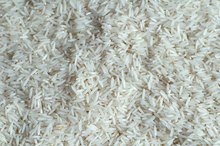Side Effects of Not Enough Carbs
If you're looking to lose weight, you might turn to a low-carbohydrate diet. However, carbs are a biologically important nutrient, so significantly reducing your intake can have negative effects of varying severity. Review the pros and cons of a low-carb diet to determine what level of carbs is right for your eating plan.
Diminished Energy and Physical Fatigue
The first noticeable side effect of restricted carb intake is usually a lack of energy and physical fatigue. In a normal diet, carbs are broken down into glucose, which can be easily absorbed into the bloodstream and used for energy. Without that energy, the body is forced to burn fat. For active individuals used to burning glycogen during exercise and replenishing it afterward, the onset of fatigue is faster and more intense. A study published in 2004 in "Nutrition and Metabolism" suggests that this is only a short-term effect, as some individuals on a long-term carb-restriction plan have unhindered athletic performance.
- The first noticeable side effect of restricted carb intake is usually a lack of energy and physical fatigue.
- For active individuals used to burning glycogen during exercise and replenishing it afterward, the onset of fatigue is faster and more intense.
Mild Depression
Bipolar and Testosterone
Learn More
Carbohydrate intake is directly linked to a release of serotonin in the brain, an important neurotransmitter for feelings of happiness and satisfaction. According to Psychology Today, low carbohydrate intake lowers levels of serotonin in the brain, resulting in mild depression-like symptoms. Insufficient carb intake could lead individuals to feel increased sadness and anger, and it may even compromise the normal effects of antidepressants.
Constipation
Dietary fiber is a type of complex carbohydrate important in maintaining stool regularity. When you limit carb-rich foods like fruits, vegetables and grains, your body may not receive an adequate amount of dietary fiber, and constipation occurs. Most low-carb diets allow fibrous leafy green vegetables, so ensuring adequate intake can mitigate these effects.
Ketosis
Low Carb Diets & Feeling Tired
Learn More
If your carb intake is restricted for a period of weeks, your body may enter a metabolic state known as ketosis. Ketosis is a disorder characterized by an excessive buildup of compounds called ketones, a byproduct of metabolizing dietary fat. Ketones increase the body’s excretion of water and electrolytes like sodium, resulting in a loss of water weight that is typically reported by low-carb dieters. Ketosis is associated with sluggishness and lethargy, especially within the first two weeks of entering the state, and also interferes with mental processing and physical flexibility, according to Vanderbilt University. The effects of ketosis are reversible and tend to disappear within a few days or weeks of restoring carb intake to normal levels.
- If your carb intake is restricted for a period of weeks, your body may enter a metabolic state known as ketosis.
- Ketones increase the body’s excretion of water and electrolytes like sodium, resulting in a loss of water weight that is typically reported by low-carb dieters.
Related Articles
References
- Nutrition and Metabolism: Ketogenic Diets and Physical Performance
- 5. McClernon F, Yancy W, Eberstein J, Atkins R, Westman E. The Effects of a Low-Carbohydrate Ketogenic Diet and a Low-Fat Diet on Mood, Hunger, and Other Self-Reported Symptoms*. Obesity. 2007;15(1):182-182. doi:10.1038/oby.2007.516
- Bueno N, de Melo I, de Oliveira S, da Rocha Ataide T. Very-low-carbohydrate ketogenic diet v. low-fat diet for long-term weight loss: a meta-analysis of randomised controlled trials. British Journal of Nutrition. 2013;110(07):1178-1187. doi:10.1017/s0007114513000548
- Daly M, Paisey R, Paisey R et al. Short-term effects of severe dietary carbohydrate-restriction advice in Type 2 diabetes-a randomized controlled trial. Diabetic Medicine. 2006;23(1):15-20. doi:10.1111/j.1464-5491.2005.01760.x
- Gardner B, Lally P, Wardle J. Making health habitual: the psychology of ‘habit-formation’ and general practice. British Journal of General Practice. 2012;62(605):664-666. doi:10.3399/bjgp12x659466
- Nieman D. Comparison of Weight-Loss Diets with Different Compositions of Fat, Protein, and Carbohydrates. Yearbook of Sports Medicine. 2010;2010:196-197. doi:10.1016/s0162-0908(09)79506-6
Writer Bio
Based in Cleveland, Derek Bryan has been writing professionally since 2009. Focusing on nutrition, health and fitness, Bryan has been featured on several notable health-related websites, including CAMCommons.com. Bryan holds an English degree from the Ohio State University, with a specialty in rhetoric and composition.









